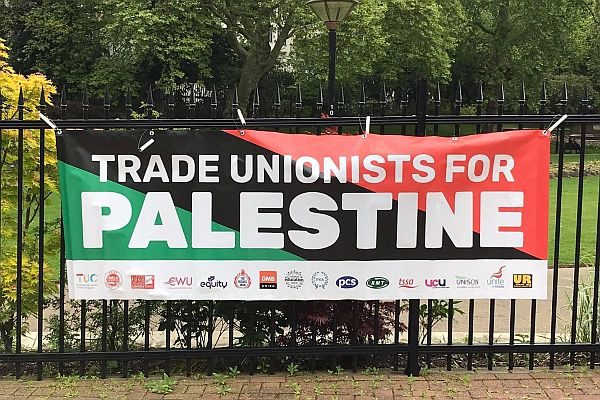On May 18, with Israeli missiles still raining over Gaza, Palestinians in Israel and the West Bank did something that the left in most parts of the world can only dream of: stage a widely-observed General Strike. Along with other organisations, Palestinian trade unions called on unionists around the world to show solidarity both with the strike itself, and with Palestinians’ ongoing struggle against Israel’s ethnic-cleansing, apartheid and bombardment.
Palestinians asked their international allies to commit to a number of solidarity measures. Prominent among these was boycotting Israel, as well as businesses and organisations that support Israeli crimes. Boycott has been the central tactic of the Palestinian liberation movement since at least 2005. There’s a very real sense in which, if you’re not prepared to boycott, your solidarity with Palestinians is only partial.
There are many ways that unions and unionists can take part in the Israel boycott. So how should they respond?
Trade unions act in the interests of justice and rights for working people. At the moment, it’s hard to think of a more prominent global justice and rights struggle than Palestine. When Palestine and Palestinian workers are finally free, it will be celebrated as one of the proudest achievements of international solidarity against racism and colonialism. Unions will want to have played their part, just as they did in the fight against apartheid in South Africa. But for unions to enact the full solidarity that Palestinians are asking for, including through boycotting Israel, it’s necessary to undo six powerful myths.
- Supporting the boycott is too divisive
This claim is usually made to stop any debate about boycotting Israel before it’s even started. Of course we support Palestinians, people say, but if we come on too strong about the boycott, we’ll alienate some union members – and we just can’t afford to do that. It often seems that, no matter how many union members come forward to explicitly demand strong action for Palestine, critics always invoke a virtual, nameless, magically larger number who would oppose it.
Unions have any number of internal disagreements. The solution is to settle them rationally, through a debate followed by a vote. A robust culture of political debate is essential to healthy, democratic unionism, and Palestine supporters should welcome the opportunity to debate the boycott in union forums. After all, if there wasn’t any opposition to Palestine solidarity, justice for Palestine would already have been achieved.
Rather than worry about the possibilities of division, union leaders should trust union members. Union members are adults, and don’t need anyone to decide what is and isn’t too divisive for them. If some people want to propose boycotting Israel, they should be allowed to do so. With properly constituted democratic forums, union members can collectively decide for themselves whether it’s a good idea.
Instead of telling our fellow union members that Palestine is divisive – a self-fulfilling prophecy – we should be telling them that it’s an urgent global justice issue, that racism and colonialism are the enemies of workers everywhere, and that meaningful solidarity is an obligation. Declaring a topic like the boycott off-limits is a sure-fire way of suppressing political energy and cultivating timidity and hesitation – exactly the qualities that employers want to foster in union members.
- Palestine is a distraction
If it’s not divisive, then maybe Palestine is a ‘distraction’. Unions have a lot on their plate, so the urge to simply get on with it without interruption is understandable. But appeals for international solidarity from an oppressed people should not simply be brushed off as a ‘distraction’, no matter how much else is going on. Once you reflect on what’s been happening in Palestine/Israel over the past few weeks alone – large sectors of Gaza lying under rubble, 274 people dead and 1500 maimed or injured, escalating ethnic cleansing of Palestinians from East Jerusalem, and rampaging vigilante mobs carrying out anti-Palestinian pogroms – it’s hard to see it as a ‘distraction’ anymore – and especially not when you talk to Palestinians themselves.
At a time when global attention is on Palestine, unions, which have often been at the forefront of social progress, have an obligation to act. It’s only a distraction if we count it as one. If a modicum of action on Palestine takes a bit of time away from other matters, why isn’t it worth it?
In Australia, many union members opt in to pay dues to APHEDA, the union movement’s overseas solidarity and aid agency. From its very inception, APHEDA has carried out work in Palestine. If Palestine is central enough to unionism to be worth spending members’ money on, it can’t be declared off-limits to debate.
- It’s not a union matter
If it’s not divisive and not a distraction, then maybe it’s just not union business. It’s sometimes argued that unionists should be free to join the boycott, but only as individuals: unions, it’s sometimes said, shouldn’t take a collective position on it.
People who hold that position are arguing for the irrelevance and redundancy of unions. Collective solidarity and action are at the very heart of unionism. If action on something as important as Palestine is an individual matter, then what isn’t? We’d never argue that working conditions, pay, or other global solidarity questions are matters for members’ individual choices. We shouldn’t argue it over Palestine and the boycott either.
- It’s not tactical
If it’s not divisive and not a distraction, and if it is union business, then maybe it’s just not ‘tactical’. Let’s raise the issue at some other time, people argue, just not now. But it seems there’s never a time when it is tactical to support Palestine decisively: with members to defend and recruit, job-cuts to oppose, or collective agreements to negotiate, it’s always possible to claim that now isn’t the right time to talk about global solidarity. Tellingly, however, those who urge that it’s not tactical now don’t often tell us when in the future it will be: tactics are usually raised not in order to define a timeline for the union supporting Palestine, but for putting the debate off indefinitely.
We also have to ask who supporting Palestine is meant to be tactical for. The devastation in Gaza and the settler-violence in Jerusalem and the West Bank mean that, at the moment, union support couldn’t be more tactical for Palestinians themselves. Given the situation they’re in, attracting the support of important social institutions like unions overseas is an obvious priority. Those of us who are in those unions don’t get to choose when solidarity matters. Solidarity isn’t solidarity if we only give it when it suits us: if it isn’t offered when it’s asked for, does it even count as solidarity at all?
- It makes no real difference
If it’s not divisive and not a distraction, and if it is a union matter and isn’t not tactical, then maybe it’s just pointless. After all, what actual difference could it make in the West Bank or Gaza whether a union somewhere else offers solidarity or not?
This objection ignores the fact that Palestinians in historic Palestine have asked the world for support through boycott. It obviously makes a difference to them whether that request is met, and it’s not for us to tell them otherwise: ignoring Palestinians’ request to boycott means inflicting a further humiliation on a subject population which has every right to expect the support of people of conscience. It’s not just Palestinians who think boycotting matters: Israel does too, and spends large sums –in 2017, the budget was $72 million – on anti-boycott activity around the world. If both the colonising power and the colonised people agree that boycotting makes a difference, why would anyone question it?
- Members will resign
Union-membership has been in decline for many years, so unions have to retain the membership they have. Agreeing to boycott Israel, critics say, or maybe even just raising the possibility, jeopardises this. It never seems to occur to people who make this objection that a principled stand on Palestine could also attract new members to the union.
The antidote to unions’ decline is political courage and principle, not timidity. Boycott-opponents presuppose that supporting the boycott can only have a negative effect on overall membership. They assume, in other words, that union members’ default position is sympathy with Israel – a strange assumption in many places, including Australia, where a Morgan poll showed in 2017 that 73 per cent of Australians support Palestinian statehood, and that 55 per cent see the call for ‘a boycott of Israeli goods, services, companies and institutions profiting from the occupation of Palestine’ as reasonable.
*
Despite Zionists’ efforts, the Palestine solidarity movement, and the boycott campaign in particular, are going from strength to strength, including in unions. As long ago as 2009, the New Zealand Council of Trade Unions resolved to support BDS, as did the Western Australian Branch of the Maritime Union of Australia. The Norwegian Trade Union Confederation voted to boycott Israel in 2017. In 2019, the British Trade Union Congress resolved to ‘prioritise Palestinians’ rights to freedom, justice and equality, including by applying these principles based on international law to all UK trade with Israel’. The same year, the Sydney branch of the Maritime Union of Australia voted to boycott HP products because of that firm’s complicity with Israel’s oppression of Palestinians. When the UK Fire Brigade union refused to remove protesters from the roof of an Israeli arms company near Leicester last week, it was showered with praise.
The May 18 general strikers asked for boycott because it ‘can directly help to throw a wrench in the economy of settler colonialism’. Deciding whether to support them isn’t some boutique, special-interest question, but a question of how far we’re prepared to contribute to a global struggle for justice for a viciously oppressed and dispossessed people – one that has brought hundreds of thousands of people onto the streets around the world. At the heart of Palestine solidarity lie the principles of antiracism, indigenous justice, refugee rights, and people’s right to live free of colonialism and the crime of apartheid. If those principles mean anything, they have to apply to Palestine, and unions must uphold them.



